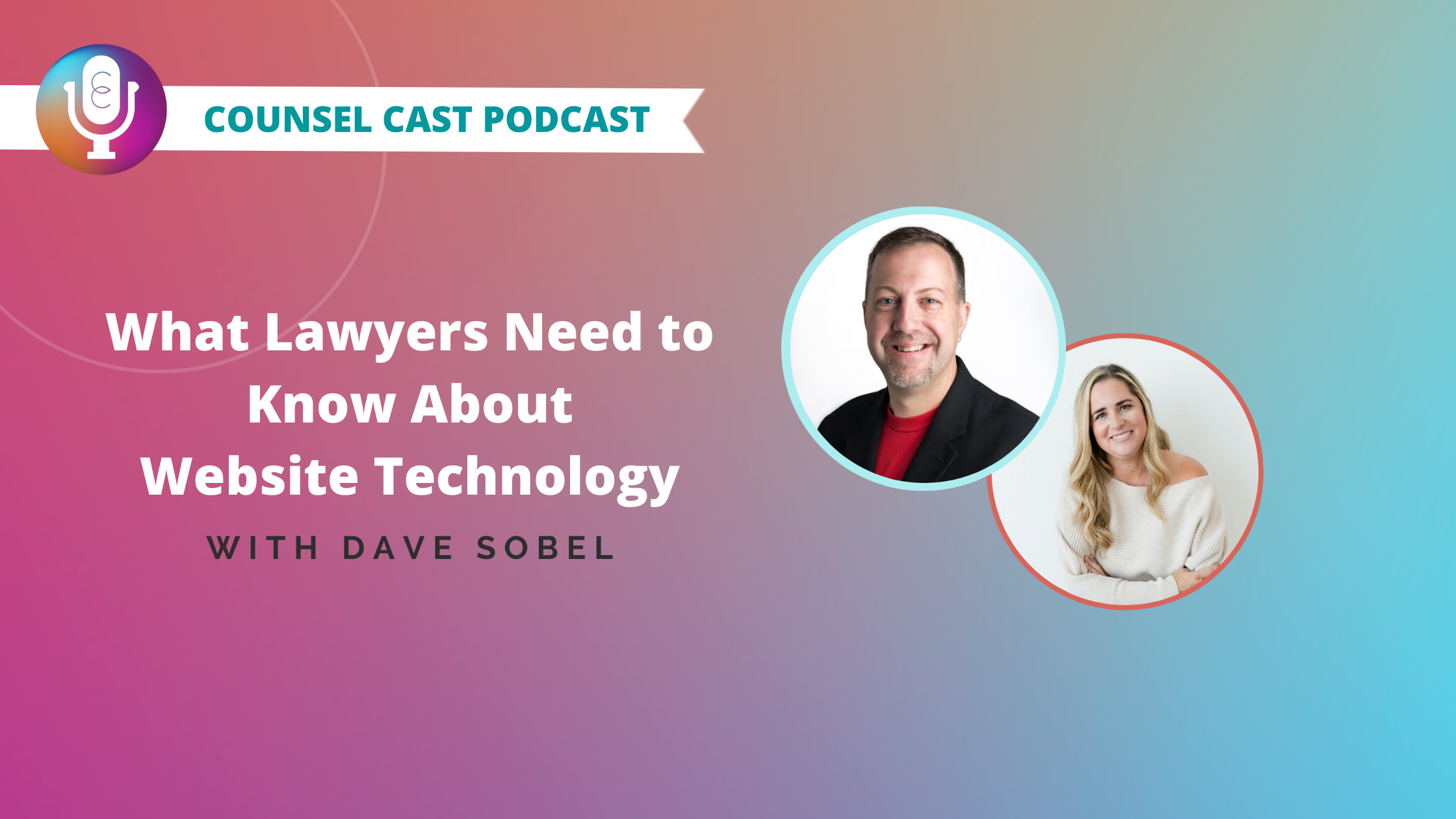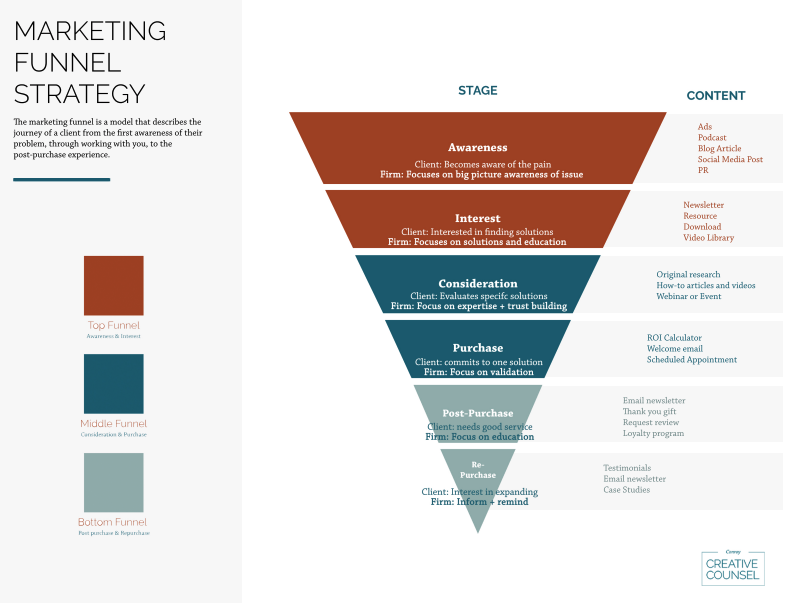Content marketing has emerged as a crucial strategy for law firms aiming to stand out in a competitive market. Unlike traditional advertising, content marketing offers an opportunity to not only attract potential clients but also to establish a firm’s authority and trustworthiness in its field of expertise. For law firms, effective content marketing can be the difference between being a market leader and being overlooked.
Successful law firm content marketing hinges on the dual goal of engaging potential clients while simultaneously building trust. This strategy involves creating and distributing relevant, valuable and consistent content to attract and retain a clearly defined audience. By addressing the specific needs, concerns, and questions of this audience, law firms can foster a relationship of trust and position themselves as an indispensable resource in their areas of legal practice.
In this blog, we will discuss the intricacies of crafting content that resonates with potential clients. We will delve into understanding your audience’s needs, developing a tailored content marketing strategy, and exploring the types of content that yield the best results for law firms.
We will cover the following topics:
- Understanding Your Audience
- Content Strategy for Law Firms
- Crafting Engaging and Informative Content
- Leveraging Different Platforms
- Measuring Success and Adjusting Strategies
- Legal and Ethical Considerations
- How Conroy Creative Counsel Can Help Your Firm
1. Understanding Your Audience
Before diving into content creation, law firms must first understand who they are speaking to. Identifying and understanding your audience is crucial to crafting content that resonates with them and engages them.
➡️ Identifying Your Target Audience
Your target audience may include potential clients seeking legal assistance, peers looking for insights into complex legal issues, or even current clients wanting to stay informed about legal matters relevant to them.
Depending on your law firm’s specialities, your audience could range from individuals facing personal legal challenges to businesses requiring corporate legal advice. Segmenting your audience based on their legal needs, demographics and where they are in the client journey can help tailor your content marketing efforts more precisely.
➡️ Understanding the Needs, Questions and Concerns of Your Audience
Once you have identified your target audience, the next step is to delve deep into understanding their specific needs and concerns. For potential clients, this might involve common legal issues within your practice area, misconceptions about the legal process, or questions about costs and outcomes. For peers, it might involve deeper legal analysis, case studies or emerging legal trends.
- Content for Individuals: They might be seeking guidance on personal legal issues, such as family law, estate planning or personal injury claims. Content that explains legal processes, outlines steps they can take on their own, and helps demystify the law can be particularly valuable for this group.
- Content for Businesses: This group may require information on compliance, contracts, employment law or intellectual property. Here, content could focus on preventive legal strategies, case law updates, and tips for avoiding common legal pitfalls.
- Content for Peers: Offering insights into complex legal debates, analysis of recent legal reforms, or advanced legal strategies, and even advice on legal content marketing can foster professional respect and referral networks.
➡️ Tailoring Your Content to Meet Your Audience’s Needs
Understanding your audience’s needs allows you to create content that addresses those needs directly. This involves:
- Creating Personas: Develop detailed personas for each group of your target audience. This helps in visualizing their challenges and crafting content that speaks directly to them.
- Answering Questions: Use your content to answer common questions your target audience might have. This not only establishes your expertise but also makes your content highly valuable to them.
- Addressing Concerns: Acknowledge the concerns and fears that potential clients might have about engaging with the legal process or hiring a lawyer. Offer reassurance through informative content that breaks down complex legal procedures into understandable steps.
- Providing Value: Ensure that every piece of content you publish provides value, whether it’s educating, informing or even entertaining. Content should always leave the reader with more knowledge or confidence about their legal situation than they had before.
- Engagement: Encourage feedback and questions from your audience to further refine your understanding of their needs and adjust your content strategy accordingly.
By thoroughly understanding your audience and tailoring your content to meet their specific needs, law firms can create a more engaging, informative and effective content marketing strategy. This not only helps in attracting potential clients and creating awareness of your legal services but also in establishing your firm as a trusted authority in its field.
2. Content Strategy for Law Firms
A well-defined content strategy is the backbone of successful marketing for law firms. It ensures that every piece of content serves a purpose, aligns with the firm’s broader goals and effectively engages with the target audience. In this section, we will outline how to develop a sound content marketing strategy, explore the types of content that are most effective for a law firm website, and discuss how to plan a content calendar to maintain a consistent publishing schedule.
➡️ Developing a Content Strategy That Aligns with Your Firm’s Goals:
To create a content strategy that supports your law firm’s objectives, start by defining those goals. Ask questions like:
- Are you looking to attract more clients in a specific area of law?
- Would you like to establish your firm as a thought leader in the industry?
- Are you looking to improve client retention?
Once your goals are clear, you can then start tailoring your content strategy to achieve them. This involves:
- Audience Segmentation: Identify and segment your audience based on their interests and your firm’s specialities. This ensures that the content you produce is relevant and engaging to each segment.
- Content Objectives: Define what each piece of content aims to achieve. Would you like to educate the audience, generate leads or enhance your firm’s brand?
- Key Performance Indicators (KPIs): Establish KPIs to measure the effectiveness of your content. This could include website traffic, engagement rates, lead generation or conversion rates.
➡️ Types of Content That Work Best for Law Firms:
Different types of content can serve different purposes in your marketing strategy. Here are some of the most effective:
- Blogs: Great for addressing common legal questions, offering advice and discussing recent changes in law. Blogs can help improve SEO and drive organic traffic to your website.
- Articles: More in-depth than blogs, articles can explore complex legal issues, and case studies, or provide detailed advice and insights on specific legal matters.
- Newsletters: Keep your audience updated with the latest news from your firm, upcoming events or developments in the legal field. Newsletters can also recap recent blog posts or articles.
- Whitepapers: Offer a deep dive into a specific legal topic, showcasing your firm’s expertise. Whitepapers are excellent for generating leads, as they can be offered in exchange for contact information.
- Infographics: Simplify complex information or statistics into an easy-to-understand and visually appealing format. They are highly shareable and great for social media.
- Videos: These can be used to introduce your firm, explain legal concepts or share client testimonials. Video content is highly engaging and can increase the time visitors spend on your website.
- Social media posts: Sharing your content in bite-size chunks on social media channels is an excellent way to amplify the reach of all other content types listed, from blogs to videos, ensuring they are seen by a wider audience.
➡️ Planning Your Content Calendar:
A content calendar helps you plan and organize your content publication schedule. It ensures a consistent content flow, which is crucial for engaging your audience and achieving your marketing goals. When planning your content calendar keep the following in mind:
- Frequency and Timing: Decide how often you will publish new content. This can vary based on your resources and the platforms you are using.
- Content Mix: Plan a mix of content types based on what your audience engages with most. Include seasonal topics or dates relevant to your practice areas.
- Responsibilities: Assign clear responsibilities for content creation, review and publishing to ensure accountability and consistency.
- Flexibility: While consistency is key, allow some flexibility in your calendar for timely content related to recent legal developments and the latest news.
By carefully developing a content strategy that aligns with your law firm’s goals, choosing the right types of content, and planning your content calendar, you can create a strong foundation for your law firm’s content marketing efforts. This strategic approach not only helps in attracting and engaging your target audience but also in establishing your law firm as a trusted authority in your areas of practice.
3. Crafting Engaging and Informative Content
For law firms, the ability to create content that is both engaging and informative can set them apart in a crowded marketplace. Content that resonates with readers not only showcases the firm’s expertise but also makes complex legal information accessible to those who need it most.
Here are some top tips for writing effective legal content:
✅ Best Practices for Writing Legal Content:
Creating content that is informative yet accessible requires a careful balance. Here are some top tips:
- Avoid Legal Jargon: Use clear and simple language to explain legal concepts. Remember, your audience may not have a legal background.
- Be Concise: Get to the point quickly. Avoid lengthy explanations that could lose the reader’s interest.
- Use Subheadings and Bullets: Break up text to make it easier to read. Subheadings and bullet points can help readers scan content and understand key points at a glance.
- Focus on Relevance: Address topics that are timely and relevant to your audience’s needs and interests.
- Provide Actionable Advice: Offer readers practical tips or steps they can take, making your content not only informative but also useful.
✅ Using Storytelling to Make Complex Legal Topics Relatable:
Storytelling can be a powerful tool in legal content marketing. By framing legal advice within a narrative, you can make abstract concepts more tangible and relatable. Consider these content ideas:
- Client Success Stories: Share stories of how your firm has helped clients overcome legal challenges while respecting privacy and confidentiality.
- Hypothetical Scenarios: Create fictional scenarios that illustrate common legal problems and how they can be resolved.
- Real-Life Cases: Discuss real cases (publicly known and without breaching confidentiality) to highlight legal principles and the judicial process.
✅ Incorporating Client Testimonials to Build Credibility:
Testimonials and case studies are effective ways to demonstrate your la firm’s success and reliability:
- Client Testimonials: Positive feedback from past clients can greatly enhance your firm’s credibility. Make sure to obtain permission before sharing any testimonials.
- Case Studies: Detailed case studies show your expertise in action, providing a deep dive into how your firm addresses and resolves complex legal issues.
✅ Tips for Optimizing Content for Search Engines (SEO):
Optimizing your content for search engines is essential to ensure it reaches your target audience. Here are some SEO tips tailored for law firms:
- Keyword Research: Conduct keyword research and identify your relevant keywords, related keywords and phrases your potential clients are searching for. Use these strategically in your content, especially in titles, headings and early in the text.
- Meta Descriptions and Title Tags: Write compelling meta descriptions and title tags that include your target keywords. These elements can influence whether someone clicks on your content from search results.
- Quality and Length: Produce high-quality, in-depth content. Longer content often ranks better, as it is seen as more authoritative.
- Mobile Optimization: Ensure your content is mobile-friendly. A significant portion of web traffic comes from mobile devices.
- Local SEO: For law firms, local SEO is crucial. Include location-based keywords and ensure your firm’s details are correct and consistent across online directories.
By adhering to these guidelines, law firms can create engaging content that performs well in search engine results, enhancing the firm’s visibility and appeal to new clients.
4. Leveraging Different Platforms
For law firms, creating compelling content is just the first step. The next is ensuring it reaches and engages the target audience effectively. Utilizing various platforms as marketing channels for content distribution is key to maximizing reach and engagement.
Here are some top tips on how to do this:
➡️ What are the Various Platforms for Distributing Content?
- Website: Your firm’s website is the cornerstone of your online presence, serving as a hub for your content. This is where potential clients go to learn more about your services, read your blog posts, access resources and ultimately contact you.
- Social Media: Platforms like LinkedIn, X (previously Twitter), Facebook and Instagram allow law firms to share content, engage with audiences and participate in industry conversations. Each platform has its own audience and best practices for content sharing.
- Email Marketing: Through newsletters and targeted email campaigns, you can deliver content directly to your subscribers’ inboxes, making it an excellent tool for nurturing leads and maintaining client relationships.
➡️ Strategies for Each Platform to Maximize Reach and Engagement:
Here are some ideas and tips on how to make the most of your available marketing channels to effectively engage with your target audience:
👉 Website Content Strategy:
- Blog Posts: Regularly update your blogs with informative and relevant articles.
- Resource Pages: Create comprehensive guides, FAQs, and resource pages on topics relevant to your practice areas.
- SEO: Optimize all content for search engines to improve visibility.
👉 Social Media Strategy:
- Content Curation: Share a mix of your own content and relevant external content to position your firm as a thought leader.
- Engagement: Actively engage with your audience by responding to comments and participating in discussions.
- Platform-Specific Content: Tailor your content to fit the format and audience of each social media platform.
👉 Email Marketing Strategy:
- Segmentation: Use list segmentation to send more personalized and relevant content to different subscriber groups.
- Content Variety: Include a mix of content types, such as articles, case studies and event announcements.
- Performance Tracking: Monitor open rates, click-through rates, and conversions to refine your strategy over time.
➡️ Integrating Content Marketing into Your Digital Marketing Strategy:
Integrating content marketing with your overall digital marketing strategy ensures a cohesive and consistent message across all channels. Here’s how to achieve this integration:
- Cross-Promotion: For successful content marketing, promote content across platforms. For example, share your latest blog post on social media and in your email newsletter.
- Paid Ads: Use paid search and social media ads to boost the visibility of your top-performing content.
- Analytics and Insights: Use analytics tools to track the performance of your content across platforms. Insights gained can help inform future content creation and distribution strategies.
- Unified Messaging: Ensure that your content reflects your brand’s voice and messaging consistently across all platforms.
- Collaboration: Coordinate between different teams (SEO, social media, email marketing) to ensure that content marketing efforts support and enhance other digital marketing initiatives. Alternatively, you may choose to engage the services of a specialized legal marketing agency, such as Conroy Creative Counsel, which has the expertise and resources to do all of this for your law firm.
By effectively leveraging different platforms and integrating content marketing into your overall digital marketing strategy, law firms can significantly enhance their online presence, attract more potential clients and establish themselves as authorities in their areas of practice.
5. Measuring Success and Adjusting Strategies
To ensure your law firm’s content marketing efforts are effective and contributing to your overall business goals, it is essential to measure success and be willing to adjust strategies based on performance data.
Here, we will explore the key performance indicators (KPIs) that can help track the success of your content marketing strategy and suggest some tools and techniques for analyzing content performance.
➡️ Key Performance Indicators (KPIs) to Track:
- Website Traffic: This measures the number of visitors to your content and it also looks at overall traffic, as well as traffic to specific content pieces or sections on your website.
- Engagement Metrics: This data includes time spent on a page, pages per session and bounce rate. These metrics help understand how engaging your content is.
- Lead Generation: This data tracks the number of leads generated through your content. This could be measured by form submissions, contact inquiries or downloads of resources like whitepapers or ebooks.
- Conversion Rate: This is the percentage of content viewers that take a desired action, such as contacting your firm, signing up for a newsletter or downloading a guide.
- Social Media Engagement: This measures likes, shares, comments and followers on your social media platforms. This indicates how well your content resonates with your audience on social media platforms.
- SEO Rankings: This tracks the search engine rankings for targeted keywords. Higher rankings can lead to increased visibility and traffic.
- Email Marketing Metrics: This is specific for email campaigns, tracking open rates, click-through rates and conversion rates to measure the effectiveness of your email content.
➡️ Tools and Techniques for Analyzing Content Performance:
- Google Analytics: This tool offers comprehensive insights into website traffic, user behavior and conversion metrics. This is absolutely essential for tracking the performance of your website content.
- SEO Tools: Platforms like SEMrush, Ahrefs or Moz provide data on keyword rankings, backlinks, and SEO health, helping you better understand how your content performs in search engines.
- Social Media Analytics: Most social media platforms offer built-in analytics to track engagement and audience growth. Tools like Hootsuite or Buffer can aggregate these metrics across platforms.
- Email Marketing Software: Services like Mailchimp or Constant Contact offer detailed reports on email campaign performance, including open rates and click-through rates.
➡️ Using Insights to Refine and Improve Your Content Strategy:
Using these tools for monitoring your data is invaluable because it gives you all the necessary information you need to refine your law firm content marketing strategy and make it more effective. You can use this data to do the following:
- Analyze Performance Regularly: Set a regular schedule for reviewing your KPIs to understand what’s working and what’s not.
- Identify Patterns: Look for patterns in the data. Which topics, formats or channels are most effective? Adjust your content plan accordingly and focus more on what’s successful.
- Test and Learn: Experiment with different content types, headlines, distribution channels and posting times to see what yields the best results. Use A/B testing where possible.
- Adjust Content Based on Feedback: Pay attention to feedback from your audience, both direct (comments, inquiries) and indirect (engagement metrics), to refine your content approach.
- Invest in High-Performing Channels: Allocate more resources to the platforms and types of content that generate the best results in terms of engagement, leads and conversions.
- SEO Optimization: Use insights from your SEO tools to optimize existing content and plan new content that targets keywords with high search volume but low competition.
By systematically measuring the success of your content marketing efforts and using these insights to refine and improve your strategy, your law firm can enhance its online presence, attract more clients, and ultimately, establish a stronger reputation in your areas of expertise.
6. Legal and Ethical Considerations
For law firms, navigating the ethical and legal landscape of marketing is crucial. Legal marketing not only requires creativity and strategy but must also adhere to strict ethical guidelines and regulations. In this section, we delve into understanding the ethical boundaries in legal marketing, ensuring content compliance with legal advertising rules and maintaining client confidentiality and trust.
➡️ Understanding the Ethical Boundaries in Legal Marketing:
Legal ethics set the foundation for all marketing and advertising activities. The American Bar Association (ABA) Model Rules of Professional Conduct provide a framework, though specific regulations can vary by state. These rules are designed to protect the public and maintain the integrity of the legal profession. Key considerations include:
- Truthfulness in Advertising: All marketing materials must be truthful, not misleading and verifiable. This applies to claims about your services, your successes and your qualifications.
- No Guarantee of Results: Ethical guidelines prohibit lawyers from making guarantees about the outcomes of cases. Marketing content must avoid any language that could be interpreted as promising specific results.
- Solicitation Rules: Direct, personal solicitation of clients (with certain exceptions) is often restricted. Understanding these rules is essential for certain types of content and engagement strategies.
➡️ Ensuring Content Complies with Legal Advertising Rules and Guidelines:
Compliance with legal advertising rules requires a thorough understanding of both ABA guidelines and local state rules. To ensure compliance you need to implement the following:
- Review and Approval Processes: Implement a review process for all marketing content to ensure it adheres to ethical standards and regulations.
- Educate Your Team: Make sure that everyone involved in content creation and distribution understands the legal and ethical guidelines.
- Stay Informed: Laws and regulations around legal advertising can evolve. Regularly update your knowledge and adjust your marketing practices accordingly.
➡️ Maintaining Client Confidentiality and Trust in Your Content:
Maintaining client confidentiality is paramount in all legal work, including marketing. Ethical marketing practices must respect client privacy and the confidential nature of legal work.
What can you do to ensure your firm complies?
- Use Discretion with Client Stories: When sharing success stories or testimonials, obtain clear consent from clients and anonymize details as necessary to protect their privacy.
- Generalize Case Studies: When using case studies to illustrate your firm’s expertise, ensure they are generalized enough to prevent the identification of clients or sensitive details.
- Secure Permissions: For any direct quotes or endorsements, secure written permission from clients, ensuring they understand how their information will be used.
Navigating the ethical landscape of legal marketing is essential for maintaining the trust and confidence of current and prospective clients. By understanding and adhering to ethical boundaries, ensuring compliance with advertising rules and guidelines, and maintaining the confidentiality and trust of your clients, your law firm can engage in effective marketing that will enhance your reputation and client relationships.
How Conroy Creative Counsel Can Help Your Firm
The reality is that the demanding nature of legal work often leaves attorneys with little time to dedicate to the nuanced and time-consuming tasks of marketing. Their schedules are typically packed with client meetings, case research and court appearances, leaving very little room for crafting and implementing effective marketing strategies.
Additionally, while lawyers are experts in the law, they may lack the specific expertise in marketing that is crucial for standing out in today’s digital landscape. Legal marketing agencies bring a depth of knowledge in both the legal industry and cutting-edge marketing tactics, enabling law firms to navigate the complex digital marketing ecosystem effectively, reach their target audience and grow their practices without diverting focus from their primary legal responsibilities.
Call on the Experts
Conroy Creative Counsel is a marketing agency specifically focused on law firms, offering a range of services to help them enhance their online presence and attract more clients through effective marketing strategies.
Here’s how we can assist your law firm:
✅ Customized Strategy Development:
- Tailored Content Strategy: We can help you develop a content marketing strategy that aligns with your law firm’s business goals, target audience and practice areas, ensuring that the content resonates with potential clients and existing clientele.
- Brand Messaging: We can help in defining and refining your law firm’s brand messaging to ensure consistency across all content, thereby increasing brand recognition and trust.
✅ Content Creation and Management:
- High-Quality Content Production: We can offer services in creating engaging and informative content, such as blog posts, articles, newsletters, whitepapers, and more, tailored to the legal industry and the specific expertise of your law firm.
- Content Calendar: We can assist in planning and managing a content calendar to ensure regular publication of content across various platforms, keeping your law firm’s audience engaged and informed.
✅ SEO and Content Optimization:
- Search Engine Optimization: We have the expertise to help you enhance your law firm’s website visibility in search engine results through keyword optimization, thus attracting more potential clients who are searching for legal advice online.
- Performance Tracking: We utilize tools and techniques to track the performance of content, enabling your law firm to understand what works best for you and optimize future content accordingly.
✅ Digital Marketing Integration:
- Comprehensive Marketing Support: Beyond content creation, we have the expertise to integrate your content marketing strategy with other digital marketing efforts, including social media marketing, email marketing, and paid advertising, to create a cohesive and comprehensive online presence.
- Website Design and Optimization: Our award-winning team will ensure that your law firm’s website is not only visually appealing but also optimized for user experience, making it easy for visitors to find the information they need and take action.
✅ Training and Consulting:
- Educational Resources: At Conroy Creative Counsel, we provide training and consultation services to your law firm’s staff on best practices for content marketing, enabling them to contribute effectively to the firm’s marketing efforts.
- Ongoing Support: We offer ongoing support and advice to our clients to adapt and refine their marketing strategy based on changing market dynamics, ensuring their firm remains competitive and relevant.
Contact Us Today
By leveraging our legal marketing expertise to develop a comprehensive marketing strategy for your law firm, you can significantly enhance your firm’s ability to attract and retain clients, establish thought leadership in your practice areas, and ultimately, achieve your business growth objectives.
Contact us today and make us your partner in transforming your law firm’s online presence with precision, creativity and legal industry insight.

















